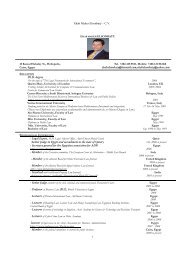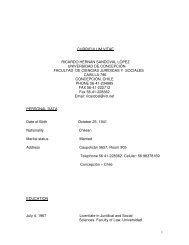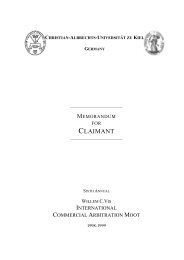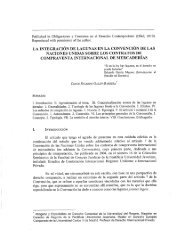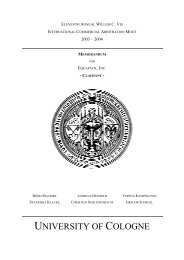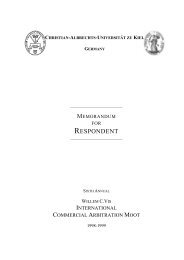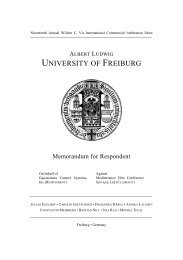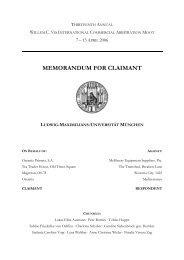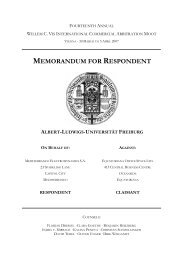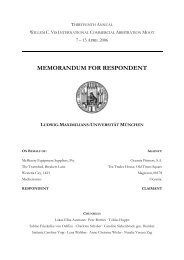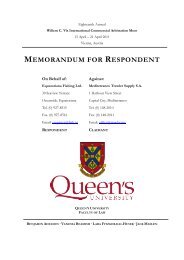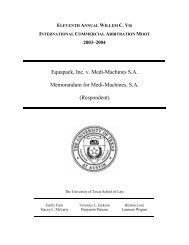CLAIMANT 0800 FINAL 12072006
CLAIMANT 0800 FINAL 12072006
CLAIMANT 0800 FINAL 12072006
You also want an ePaper? Increase the reach of your titles
YUMPU automatically turns print PDFs into web optimized ePapers that Google loves.
non-existent institution, e.g. the “CCI of Utopia” [see infra 17; see furthermore Scalbert/Marville 119;<br />
Astra Footwear (USA); Bayerisches Oberstes LG, 28 Feb. 2000 (Ger.)]. However, where the agreement<br />
permits an interpretation that accords with both party intent and logic, the agreement should be<br />
construed in favor of arbitration at the institution that best effectuates the parties’ intent<br />
[Gaillard/Savage 262-3; Lew/Mistelis/Kröll 155-6; see also Cour de Cassation, 14 Dec. 1983 (Fr.) (Belgrade<br />
Chamber of Commerce interpreted as Foreign Trade Arbitration Court at the Economic Chamber of Yugoslavia)].<br />
An agreement stating no more than “arbitration: Hamburg, West Germany” was interpreted by the<br />
Arbitration Court of the German Coffee Association as conferring jurisdiction based on its<br />
reference to a geographical location and party intent expressed outside the agreement. This award<br />
was recognized by a German court [Hanseatisches OLG (Hamburg), 24 Jan. 2003 (Ger.)]. In the present<br />
case, the arbitration agreement not only designated a geographical location, but a set of rules specific<br />
to that location, i.e. the International Arbitration Rules.<br />
28. In sum, both the language of the arbitration agreement and the surrounding circumstances indicate<br />
that the parties agreed to institutional arbitration under the Romanian Rules administered by the<br />
Court of International Commercial Arbitration at the CCI of Romania.<br />
IV. THE PARTIES’ DISPUTE FALLS WITHIN THE SCOPE OF THE ARBITRATION AGREEMENT<br />
AND IS ARBITRABLE.<br />
29. Not only is the parties’ agreement to arbitrate valid and sufficiently specific in designating an arbitral<br />
institution and a set of procedural rules, but the scope of the agreement is broad enough to<br />
encompass the issue in dispute (A) and the Claim is arbitrable (B), both as required by Art. II(1) of<br />
the New York Convention.<br />
A. The dispute is within the scope of the arbitration agreement.<br />
30. The specific wording of the arbitration clause determines the scope of the agreement [Broches 39-40;<br />
Redfern/Hunter 3-37 to 3-41]. The phrase “arising out of or in connection with” is the broadest<br />
language common to standard form arbitration clauses. This language has been interpreted to<br />
require arbitration of all claims flowing from contractual obligations [Redfern/Hunter 3-40; Born 319-<br />
20]. Here, the Contract submits “all disputes arising out of or in connection with [the] Contract” to<br />
arbitration [Cl. Ex. 1 34], and Claimant has asserted a contract claim.<br />
B. The Claim is arbitrable.<br />
31. An arbitration agreement is valid and an award rendered on the basis of that agreement is<br />
enforceable only if the underlying subject matter is arbitrable. Arbitrability is defined in the New<br />
12



